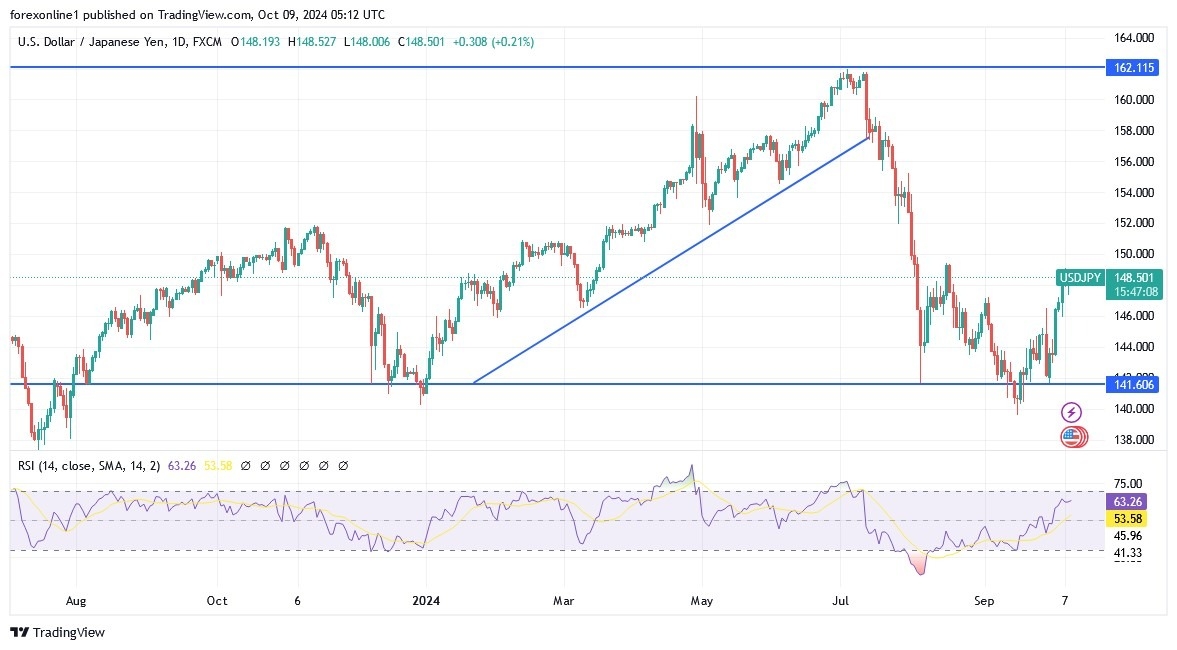- The Japanese yen remained weak at around 148.55 yen per US dollar on Wednesday after falling to its lowest level in seven weeks in the previous session, as investors continued to assess the Bank of Japan's monetary policy outlook.
- In its latest quarterly report, the BoJ said that price and wage increases are spreading across Japan, but acknowledged concerns among small and medium-sized enterprises about declining margins.

At the same time, economic data showed that real wages in Japan fell by 0.6% in August after two months of increases, while household spending declined by 1.9%. recently, the yen has come under pressure after new Japanese Prime Minister Shigeru Ishiba and Economy Minister Ryusei Akizawa called for caution before raising interest rates further under current economic conditions.
Meanwhile, the US dollar received additional support from a stronger-than-expected US jobs report on Friday, which prompted markets to discount any chances of another 50-basis point rate cut by the Federal Reserve in November.
Elsewhere, Japan’s 10-year yields hover near a two-month high. According to trade, the yield on the 10-year Japanese government bond settled at around 0.92% on Tuesday, hovering near a two-month high and tracking a rise in US Treasury yields as investors recalibrated expectations for a rate cut by the Federal Reserve after the stronger-than-expected US jobs report in September. Now, financial markets see an 87% chance that the Fed will opt for a more modest 25 basis point cut in November, while discounting any chances of another half-percentage point cut.
Domestically, the Bank of Japan said in its latest quarterly report that rising prices and wages were spreading across Japan, but acknowledged concerns among small and medium-sized companies about falling margins. Meanwhile, data showed that real wages in Japan fell 0.6% in August after two months of increases, while household spending fell 1.9%.
According to the economic calendar, Japan's services sector sentiment declined from a 5-month high. As announced, Japan's services sector index fell to 47.8 in September 2024 from a five-month high of 49.0 in the previous month, but exceeded market expectations of 47.5. This represents the first decline in four months, driven by a decline in the services industry. In contrast, the food and beverage industry showed positive growth.
Meanwhile, the employment index rose. In addition, the business sentiment gauge accelerated, driven by an increase in the manufacturing industry. For now, the economic expectations index fell to 49.7 after hitting a five-month high of 50.3 in August, marking weakness for the first time since May, as the economy continues to show a gradual recovery amid the impact of price pressures.
According to stock trading platforms, US futures flat after market rebound. US stock futures were little changed on Wednesday after a tech-led rally on Wall Street in the previous session. In regular trading on Tuesday, the S&P 500 and the Nasdaq Composite jumped 0.97% and 1.45%, respectively, while the Dow Jones Industrial Average rose 0.3%. Nine of the 11 sectors in the S&P 500 ended higher, led by technology, telecommunications services and consumer discretionary stocks. Tech giants such as Nvidia (4.1%), Apple (1.8%) and Meta Platforms (1.4%) were notable performers. Meanwhile, energy and materials stocks, including Exxon Mobil (-2.7%), Chevron (-1.6%) and Southern Copper (-3.8%), were lower. Moreover, the moves came after a strong jobs report last week raised hopes for a soft landing by the Federal Reserve. Also, investors reacted to the sharp drop in crude oil prices, while the US 10-year yield remained above 4%.
However, investors expect more volatility in the run-up to the US presidential election. Now, financial markets are looking ahead to the latest Federal Reserve minutes and major banks’ earnings.
Top Forex Brokers
USD/JPY Technical Analysis and Expectations Today:
Based on the daily chart attached, the USD/JPY pair is in an upward channel that has recently formed and will strengthen if the pair moves above the psychological resistance level of 150.00. technically, there is a chance for this to happen if the minutes of the latest US Federal Reserve meeting are more hawkish and if US inflation figures come in stronger than expected. Conversely, the bears may find an opportunity to recoup recent losses. Furthermore, the support level of 145.90 is a real threat to the current upward rebound. Ultimately, we still prefer buying USD/JPY from any downward level.
Want to trade our USD/JPY forex analysis and predictions? Here's a list of forex brokers in Japan to check out.
